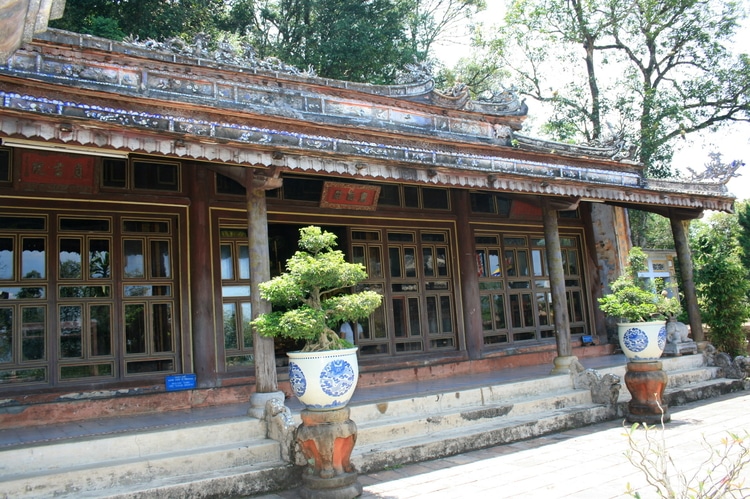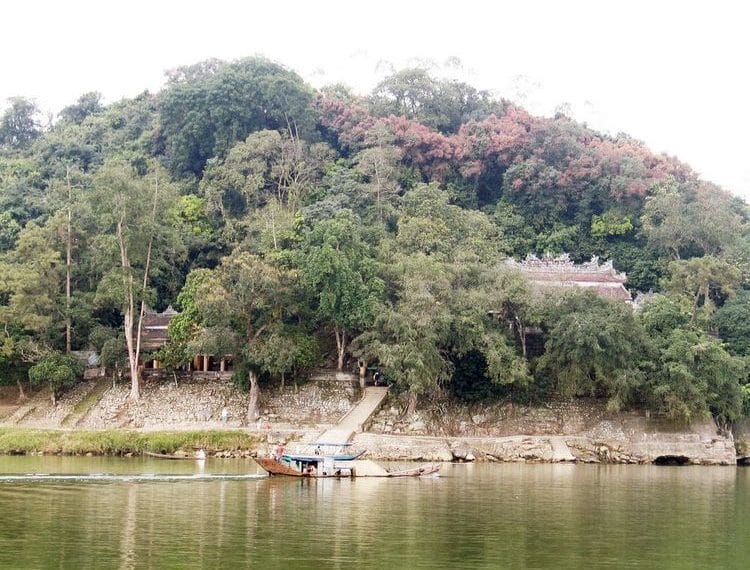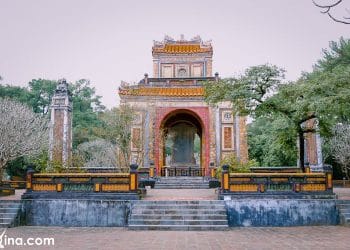Updated: 11/27/2019
Anecdote
Among the Hue Monuments Complex, Hon Chen palace is stick to many tales. People rumoured that Hon Chen palace or Hoan Chen was meant “returning jade cup”. When King Minh Mang came here and fell a jade cup into Huong river, suddenly a tortoise rose to the surface and hold the cup in its mouth. The name “Hon Chen” started there. Until King Dong Khanh’s period (1886-1888), it was changed into Hue Nam palace. Through many years, people call it Hon Chen or Hoan Chen palace.
History
From 1883 to 1885, King Dong Khanh, the adopted son of Tu Duc King had not been succeeding as a king. He asked his mother Kien Thai Vuong to go to the palace to ask Holy Mother Thien Y A Na whether he would be a king or not. In 1886, Dong Khanh King had rebuilt this palace with a larger and more beautiful architectural scale and equipped with many worshipping objects. He changed its name into Hue Nam palace to pay respect to The Holy Mother Thien Y A Na. Hue Nam means bestowing favours to Vietnam, Viet King.
Extraordinarily, Dong Khanh King developed the annual festival into a national one. He acknowledged him as a student of Holy Mother Thien A Y Na, although he called Holy Mother “sister”. In the past, every king had a higher position than Gods nationwide; however, Dong Khanh king considered himself as The Holy Mother’s brother.
Cultural And Religious Values

The Hon Chen Temple was the place in the old days the ancient Cham people worshipped the cult of Po Nagar Goddess. After that, the Vietnamese, according to Thien Tien Thanh Giao continued to pray as the name called the Heaven Goddess Y A Na. In acceptance of a unique religious monument like Hon Chen palace, Vietnamese people were secure in the harmony of Cham belief. It stated that Vietnamese and Cham people share the resemblance in culture. Spiritedly, this is a kind of religious association or localization.
Besides, Hon Chen temple is an attractive destination for tourists due to its charming beauty of landscapes. The architecture of the temple, combined with the scenery of the Huong River, villages, mountains creates a more poetic and romantic view. Hon Chen is located at a beautiful site seated on the slope of the mountain Ngoc Tran (Jade-cup) with sheer cliff and reflecting in deep blue water of the Huong River. Hon Chen Temple also plays an essential role for Hue people’s spiritual life and is the only temple in combination between court ceremony etiquette and fork beliefs; between festivals and sorcery; between religious culture and superstition.
Last but not least, Hon Chen or Jade-cup temple is also the first-rate architectural art in the late 19th century. Hon Chen Palace has more than ten architectural works, located on Ngoc Tran mountain, next to the Huong River. Minh Kinh Dai is not only the leading architecture but also the most meaningful work. Minh Kinh Dai is the location where the ceremony occurred in Hon Chen temple.
Minh Kinh Dai is classified into three sections with the hierarchy: the first building (also called Thuong Cung), the place of worshipping The Holy Mother Thien Y A Na, Lieu Hanh Cong Chua, Dong Khanh King and some other gods. The second building is the site of worship of a variety of statues of different gods, as well as the location of worship items to receive the ritual of significant occasions. The third building is in incense; two sides set the drum, the bell is the place of worshipping and is the place where visitors are making offering incense.
About the fine-art decoration, Minh Kinh Dai sticks to the main focus. The image of the Phoenix had the origin from the place where the ancient goddess was worshipped. Decoration in Hon Chen Temple makes the worship space and the spiritual world closer to man. It is considered one of the places in which fine-art decoration reached its peak in the late 19th century.
Festival

Coming to Hon Chen Palace, you will admire an ancient architectural feature on the Huong River, learn about Hue’s religion, history, culture and people. In particular, Hue Nam Temple Festival is also known as the Mother’s Day Ceremony. It means the filial piety towards the mother who gave us life, so this festival takes place with solemn rituals. The 3rd day of the third lunar month (spring festival) and the seventh lunar month (autumn festival) are bustling with Hue Nam Temple Festival at Hon Chen temple. Huong River becomes splendid with flag, flower, incense. Thousands of people from early morning have moved on hundreds of dragon boats to be present at the Toa Kham Boat (Huong River) to participate in the festival. In the night of the festival, everyone court dress that looks like a prince and princess in the Nguyen Dynasty. At the end of the festival, people hold ceremonies of releasing and floating lanterns.
By M. Phuong















